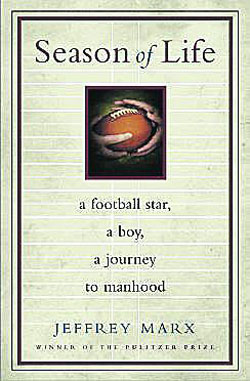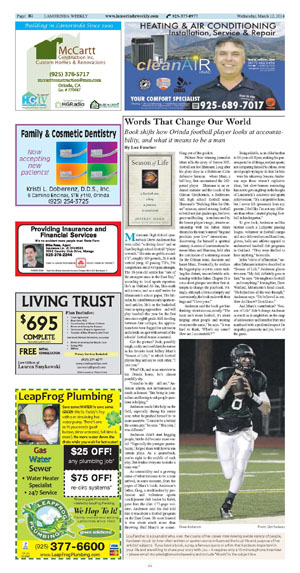| | Published March 12th, 2014
| Words That Change Our WorldBook shifts how Orinda football player looks at accountability, and what it means to be a man
| | By Lou Fancher |  | | |
Miramonte High School quarterback Drew Anderson has been called "a driving force" and an East Bay high school football "player to watch." His stats are public record: 6'3", roughly 185 pounds, 26.8 inch vertical jump, 47 passing TD's, 256 completions out of 435 pass attempts. The 18-year-old senior has "one of the strongest arms in the East Bay," according to local sports reporters. He's an Oakland A's fan, likes math and science, and as a staff writer for Miramonte's school paper, The Mirador, he contributes mostly sports-related articles. He's on the basketball team as spring approaches - and will play baseball this year for the first time since eighth grade. Still deciding between four colleges, his applications have been flagged for admission and a walk-on spot with several of the schools' football teams is assured.
 Got the picture? Jock, possibly tough, cocky and confident; he names as his favorite book Jeffrey Marx's "Season of Life," in which football players hug and say to each other, "I love you."
Got the picture? Jock, possibly tough, cocky and confident; he names as his favorite book Jeffrey Marx's "Season of Life," in which football players hug and say to each other, "I love you."
 What? Oh, and in an interview in his Orinda home, he's almost painfully shy.
What? Oh, and in an interview in his Orinda home, he's almost painfully shy.
 "I used to be shy - still am," Anderson admits, not embarrassed as much as honest. "But being in journalism and having to ask people questions is helping."
"I used to be shy - still am," Anderson admits, not embarrassed as much as honest. "But being in journalism and having to ask people questions is helping."
 Anderson needs little help on the field, especially during his senior year, when he pushed himself to be more assertive. "I used to be a behind the scenes guy," he says. "This year, I was different."
Anderson needs little help on the field, especially during his senior year, when he pushed himself to be more assertive. "I used to be a behind the scenes guy," he says. "This year, I was different."
 Anderson didn't start hugging people, but he did become more verbal. "Especially the younger quarterbacks; I helped them with how to run certain plays. As a quarterback, you're right in the middle of each play. But it takes everyone to make a team win."
Anderson didn't start hugging people, but he did become more verbal. "Especially the younger quarterbacks; I helped them with how to run certain plays. As a quarterback, you're right in the middle of each play. But it takes everyone to make a team win."
 Accountability and a growing sense of what it means to be a man arrived, in some measure, from the pages of Marx's book. Anderson's father, Greg, a stockbroker by profession and volunteer sports coach/parent club leader by habit, gave him the slim 177-page volume. Anderson said his dad told him it was about a football program on the East Coast. He soon learned it was about much more than throwing Hail Mary's or scrambling out of the pocket.
Accountability and a growing sense of what it means to be a man arrived, in some measure, from the pages of Marx's book. Anderson's father, Greg, a stockbroker by profession and volunteer sports coach/parent club leader by habit, gave him the slim 177-page volume. Anderson said his dad told him it was about a football program on the East Coast. He soon learned it was about much more than throwing Hail Mary's or scrambling out of the pocket.
 Pulitzer Prize winning journalist Marx tells the story of former NFL football star Joe Ehrmann. Long after his glory days as a Baltimore Colts defensive lineman - where Marx, a ball boy, first encountered the 260-pound player - Ehrmann is an ordained minister and the coach of the Gilman Greyhounds, a Baltimore, Md. high school football team. Ehrmann's "Building Men for Others" mission, aimed at using football to build not just quadriceps, but love, grace and healing - is underscored by the former player's tragic, abusive relationship with his father. Marx chronicles the team's surreal "hug and proclaim your love" interactions - discovering for himself a spiritual journey. A series of conversations between Marx and Ehrmann, held after the conclusion of a stunning season for the Gilman team, fascinate and haunt Marx. Eventually, he realizes the biggest play is yet to come: tackling his distant, uncomfortable relationship with his father. Chapter 21 is a too-short glimpse into their first attempts to change the playbook. Fittingly, although a bit too abruptly and conveniently, the book ends with their hugs and "I love yous."
Pulitzer Prize winning journalist Marx tells the story of former NFL football star Joe Ehrmann. Long after his glory days as a Baltimore Colts defensive lineman - where Marx, a ball boy, first encountered the 260-pound player - Ehrmann is an ordained minister and the coach of the Gilman Greyhounds, a Baltimore, Md. high school football team. Ehrmann's "Building Men for Others" mission, aimed at using football to build not just quadriceps, but love, grace and healing - is underscored by the former player's tragic, abusive relationship with his father. Marx chronicles the team's surreal "hug and proclaim your love" interactions - discovering for himself a spiritual journey. A series of conversations between Marx and Ehrmann, held after the conclusion of a stunning season for the Gilman team, fascinate and haunt Marx. Eventually, he realizes the biggest play is yet to come: tackling his distant, uncomfortable relationship with his father. Chapter 21 is a too-short glimpse into their first attempts to change the playbook. Fittingly, although a bit too abruptly and conveniently, the book ends with their hugs and "I love yous."
 Anderson said the book got him thinking: about success, mostly. "The book isn't about football, it's about helping other people and treating everyone the same," he says. "It was hard to think, 'What's my cause? How am I accountable?'"
Anderson said the book got him thinking: about success, mostly. "The book isn't about football, it's about helping other people and treating everyone the same," he says. "It was hard to think, 'What's my cause? How am I accountable?'"
 Being reliable, as an older brother to 16-year-old Ryan; making his parents proud in all things, not just sports; not comparing himself to others, even amid people trying to do that for him - were his takeaway lessons. Anderson says these weren't explosive ideas, but slow-burners reminding him not to get caught up in the hoopla of Lamorinda's academic and sports achievement. "It's competitive here, but I never felt (pressure) from my parents. I feel like I'm not any different than when I started playing football in kindergarten."
Being reliable, as an older brother to 16-year-old Ryan; making his parents proud in all things, not just sports; not comparing himself to others, even amid people trying to do that for him - were his takeaway lessons. Anderson says these weren't explosive ideas, but slow-burners reminding him not to get caught up in the hoopla of Lamorinda's academic and sports achievement. "It's competitive here, but I never felt (pressure) from my parents. I feel like I'm not any different than when I started playing football in kindergarten."
 To give back, Anderson and his brother coach a Lafayette passing league, volunteer at football camps and once delivered second-hand bats, gloves, balls and athletic apparel to underserved baseball club programs in Oakland. "They were thrilled to have anything," he recalls.
To give back, Anderson and his brother coach a Lafayette passing league, volunteer at football camps and once delivered second-hand bats, gloves, balls and athletic apparel to underserved baseball club programs in Oakland. "They were thrilled to have anything," he recalls.
 In his "circle of affirmation," another Erhmann initiative described in "Season of Life," Anderson places two men. "My dad, definitely goes in first," he says. "He taught me football - and everything." Joining him, Dave Winford, Miramonte's head coach. "He helped me all the way through," Anderson says. "He believed in me. How do I know? He told me."
In his "circle of affirmation," another Erhmann initiative described in "Season of Life," Anderson places two men. "My dad, definitely goes in first," he says. "He taught me football - and everything." Joining him, Dave Winford, Miramonte's head coach. "He helped me all the way through," Anderson says. "He believed in me. How do I know? He told me."
 And Marx's contribution? "Season of Life" didn't change Anderson as much as it caught him on the cusp of adolescence and launched him into manhood with a profound respect for empathy, generosity and yes, love of the game.
And Marx's contribution? "Season of Life" didn't change Anderson as much as it caught him on the cusp of adolescence and launched him into manhood with a profound respect for empathy, generosity and yes, love of the game.

|
 | | Drew Anderson Photo Gint Federas | | | | | | | | | |




